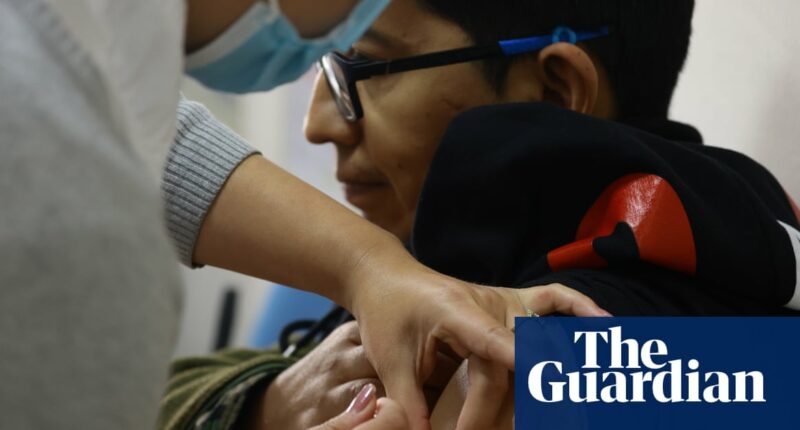Share this @internewscast.com
Experts at the Cop30 climate summit have raised alarms about the escalating health threats posed by the climate crisis, as South America witnesses a surge in yellow fever and dengue cases. These mosquito-borne diseases, along with dangerous heatwaves, are increasingly infiltrating temperate areas like Europe.
According to the Pan American Health Organization, South America has recorded 356 yellow fever cases and 152 fatalities this year, predominantly in the Amazon region. This marks one of the highest tallies since 1960, excluding a notable rise in 2017 and 2018.
The current outbreak of yellow fever, which can lead to fever, nausea, and even organ failure, coincides with Brazil experiencing one of its worst years for dengue. In 2024, the country reported nearly 6.5 million dengue cases and approximately 5,000 deaths. Europe also faced an unexpected dengue surge last year, with 304 cases reported—exceeding the combined total of the previous 15 years.
Aedes mosquitoes, responsible for spreading both yellow fever and dengue, thrive in warm temperatures and stagnant water. The climate crisis, characterized by rising global temperatures and intense rainfall, exacerbates about half of all known human infectious diseases. This allows the mosquitoes to extend their reach as the planet heats up.
The Amazon region’s spike in disease incidence coincides with UN climate discussions in Belém, a Brazilian city near the Amazon River’s mouth, highlighting the urgent need for action.
Health issues, once a peripheral concern at these summits, have gained prominence. The UN has designated Thursday as “health day” at Cop30, launching a plan to aid countries in tackling the health challenges posed by a warming planet.
“Across the world, people are living the daily reality that the climate crisis is also a public health crisis,” said Simon Stiell, the UN’s climate chief. “Rising temperatures, floods, droughts, and storms are claiming lives, fueling diseases and malnutrition, and placing immense pressure on health systems.”
Stiell said the new Belém Health Action Plan, led by Brazil’s government and the World Health Organization, will help countries with surveillance, best practices and capacity building to help them deal with climate-fueled health issues. A coalition of 35 philanthropic bodies has pledged $300m in funding for the initiative.
“Humanity can only win this global climate fight if we connect stronger climate actions to people’s top priorities in their daily lives,” Stiell said. “And there are few higher priorities than our health.”
But climate advocates and health experts say much more will need to be done to deal with the fallout from scorching temperatures and worsening disasters such as flooding. On Wednesday, Al Gore, the former US vice-president, said that recent evidence that rising heat is killing one person a minute worldwide shows that governments are badly failing to curb the direct human harm of the climate crisis.
“How long are we going to stand by … keep turning the thermostat up so that these sort of events get even worse? Gore said.
Health experts said that several factors are causing the expansion of infectious diseases, such as the razing of forests for agriculture and housing, which is bringing humans closer to animals that can spread zoonotic diseases.
“It’s globalization as well and it’s also the fact that mosquitoes are smart and so are bacteria,” said Maria Guevara, the international medical secretary of Médecins Sans Frontières, or Doctors Without Borders, who is at the Belem gathering.
“And whether it’s bacteria or viruses, they transmit, they’re just smarter than humans in that case because they’re more adapted, and they will adapt to survive. We are much too slow. We know what we need to do about climate change, but we’re not doing anything.”
Guevara said much more will need to be done to equip countries that are having outbreaks of disease worsened by the extreme weather. MSF has in recent years had to respond to outbreaks of yellow fever in Brazil and the Democratic Republic of Congo in the wake of severe droughts or floods. Distribution of vaccines can be difficult even in countries like Brazil, where yellow fever inoculations are free.
“We’ve had huge outbreaks of dengue and an increase in yellow fever even outside of the Amazon region because of lots of rain and high temperatures, which makes the mosquitoes bite more and affects the reproduction of virus in the mosquitoes,” said Rachel Vicente, an expert at the health sciences center at Brazil’s Federal University of Espírito Santo.
“People are living near more breeding sites, too, especially in urban areas of Brazil. It’s a perfect storm and it’s not just a problem of tropical areas any more, we’ve had outbreaks in Europe because it is getting warmer there and is becoming easier for the vector.
“We all need to collaborate more on resilience because all countries will need to prepare for this now, not just some of them.”












